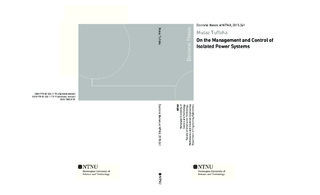| dc.description.abstract | Power systems have been a rich arena for research and study since the very beginning
of their use commercially in the late 19th century. At the beginning,
the objectives of the research were focused on the stability and reliability of the
power systems, especially with the fast growth in their size and in the demand
on the electric power. Later, due to the need to save losses and fuel consumption,
the increasing awareness of the environmental challenges, the growing desire
to integrate renewable energy resources, and many other reasons, the attention
of the research was drawn to another essential topic, that is the management
and planning of power systems. Isolated power systems, however, did not
receive similar attention until recently. Isolated power systems are indispensable
in many applications such as, but not limited to, island power systems and marine
vessels. This work addresses two different topics in the study of power systems
that are intended for isolated power systems, but the results provided can
also be expanded to regular ones. Thus, the thesis is divided into two parts: the
management and scheduling of the power systems, and the control of Gensets.
The first part contains our contributions in the field of operations research and
the management of power systems after providing a brief introduction to integer
programming (IP), mixed-integer programming (MIP), and propositional calculus.
This introductory chapter is fundamental to understand the basic concepts that
were used to develop the models and techniques throughout this work. Then, we describe
a new technique to represent piecewise linear (PWL) functions in optimization
problems based on mixed-logical inequalities. The proposed technique is best
suited for special class of discontinuous functions that cannot be handled by the
regular SOS method. Finally, we introduce our main contribution in this thesis in
the fourth chapter, that discusses the unit commitment (UC) and economic dispatch
(ED) problems. In this chapter, we present a state-space model in discrete time
that can be used to solve both the UC and ED, simultaneously. Such models can be
useful when model predictive control (MPC) philosophy is considered to make the
scheduling and planning of power systems more reliable and adaptive to changes in
the demand side. Further, we show by simulations that the proposed model could be
more accurate than the commonly-used ones. We believe that the proposed model
can be the core model for all kinds of power systems, not only the isolated one.
In the second part, we present our results regarding the control of the generating
set (Genset) that comprises a Diesel engine and a synchronous generator. In chapter 5, we present a control-oriented model of the Genset, and design a controller by
feedback linearisation to regulate the shaft speed and the terminal voltage, simultaneously,
through two control inputs: the fuel mass and the voltage of the field
excitation circuit. We provide simulations to show that the proposed controller
make the two manipulated control inputs interact with each other, i.e. they both
respond to any change of the terminal voltage or the load. In addition, we discuss
the robustness of the proposed controller to unmeasured disturbances, uncertainties,
and time delays imposed by the Diesel engine, if they are not so large.
Chapter 6 discusses special class of marine Gensets or shaft generators. In this type
of marine Gensets, the Diesel engine is connected through a clutch and a gear box
to a synchronous machine, and the main propeller. Such Gensets can be operated
in different modes. Thus, we extend the model proposed in Chapter 5 to include
the main propeller. Then, we design a controller to regulate the shaft speed and the
terminal voltage in one mode of operation. Also, we provide some simulations to
show that the proposed controller can be considered robust to small uncertainties
and time delays.
The last chapter summarizes the main contributions of this work, and discusses
recommendations for possible future work. | nb_NO |
